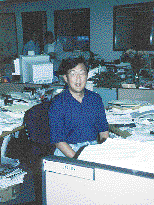|
GOLDSEA |
ASIAN AMERICAN RAGS-TO-RICHES SAGAS
MIDAS OF MEMORY
PAGE 4 OF 6
The cold German winters added to the hardship. He rented a loft from an old couple who rationed the pieces of coals he could burn. Upon awaking at four every morning he had to break the ice on his water bucket to wash his face. There was neither a bathroom nor a shower. He showered once a week at an outside bathhouse.
Two years of hardship earned Tu fluency in German and a certificate that made him eligible for college.
He chose the University of Darmstadt, but again he found himself just getting by. "I wasn't a scholar." He persevered only because he felt he owed it to his parents to finish the six-year curriculum.
Tu left Germany for the first time during the summer of 1966, just before his final year of school. His first stop was the United States to visit his sister in Concord, Massachusetts.
"As soon as I landed in New York," Tu recalls, "I fell in love with this country. The first thing I felt was that no one treated me as a foreigner. Everyone immediately included me." Tu made up his mind: after school, he's coming to the U.S.
His sister suggested he get a job and at least make some money. "I don't need an apprenticeship? I can just walk in anyplace and ask for a job?" Tu was amazed.
His sister took him to the post office to get a social security number. Then Tu gingerly approached the chef in the Howard Johnson's down the street. "I want a job," Tu told the chef. "He asked if I was Chinese. Yes. 'Then you must know how to cook! Can you start tomorrow morning?'"
The next day Tu learned how to make hamburgers, fry shrimp and clean the stove. His English was meager. Once a waitress asked for an order of peas. Tu simply had no idea what peas were, so he just kept giving her different things. Finally, the amused waitress understood and showed him the peas.
Working in the U.S. was a very different experience from Germany. "People treat you just like you are part of the community," says Tu. "If you don't know something, they will help."
For the second leg of his summer tour Tu met his family in Hong Kong. There, his parents introduced him to Margaret, a stewardess for British Airways who, two years later, would become his first wife.
The living may have been good outside of Germany, but Tu was determined to finish school. Margaret visited every few months. Romance was high. In 1968 the two married.
Tu was a year out of school and working at Motorola in Viesbaden when they tied the knot. Germany was the wrong place to start their married life. Margaret couldn't cope with the country. It was simply too foreign. Germany held no attraction for Tu, either.
"Though I was fully assimilated into German culture, I knew that the Germans would not completely accept me," says Tu. "No matter how good you speak the language, no matter how close friends you are, they will always treat you like an outsider."
[CONTINUED BELOW]
It was 1969, the Summer of Love. Tu's sister had moved to Arizona with her husband. Tu and Margaret settled in Scottsdale, a magnet for artists and budget sunseekers.
Initially, neither could find jobs. The financial strain brought out sides neither had seen in the other. Barely six months in the U.S. they separated.
Tu couldn't find engineering work. In any case he had accepted the fact that he didn't like being an engineer.
"Whatever you do, you better be the best," says Tu. "I knew I wasn't a great engineer. Like always, I just got by." It was time to explore new options. Tu gave expression to a long suppressed interest in business by opening a Scottsdale gift shop. He stocked it with trinkets his parents shipped from Taiwan. At the end of the year verything had sold but Tu found he had no profit to show for his efforts. Checking his records, he discovered that the biggest single expense had been rent. The way to make money, Tu decided, was to be a landlord. In 1971 Tu opened escrow on a $50,000 commercial lot on which he intended to build a retail building. Unbeknownst to him, Arizona real estate was about to enjoy a boom of epic proportions. By the time he closed escrow 3 1/2 months later, property value had jumped 15%. He could get a bank loan that fully covered his down payment.
Tu continued buying and developing commercial properties until the late 70s when the market begin falling. By then the Taiwanese immigrant with the German accent had become a millionaire. Tu left provincial Arizona in favor of Southern California's diversity and opportunity.
The dawn of the personal computer revolution was showing its first rays. Apple had just released what was, for all practical purposes, a toy. IBM was trying to release its own PC. No one took it seriously.
PAGE 5
PAGE 1 |
2 |
3 |
4 |
5 |
6 |
|
|
|
|


The only feature that distinguishes Tu's cubicle is the nameplate.
|
<
|
"As soon as I landed in New York I fell in love with this country. The first thing I felt was that no one treated me as a foreigner."
|
CONTACT US
|
ADVERTISING INFO
© 1996-2013 Asian Media Group Inc
No part of the contents of this site may be reproduced without prior written permission.
|







